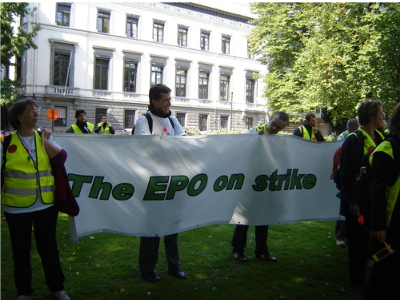Summary: A fresh look at two companies that attack Linux using patents (one of which breaks the very same laws that it's using against Linux)
THE patent system
seems to be broken and offenders include rivals of GNU/Linux, such as Apple and Microsoft. Let us look at the latest news.
Apple
Apple is not a friend, especially when it comes to software patents. To give just a sample of recent posts about Apple and patents:
- Patents Roundup: Patents as Deterrent Against Innovation, Apple's Role, and Bilski's Toll
- How Microsoft (and Apple) Wants to Own GNU/Linux, in the 'Intellectual' Sense
- Patents Roundup: Linux, Microsoft, Apple, Patent Trolls and Reform
- Patents Roundup: Apple, Microsoft Trolls, and Linux
- Novell Collects Software Patents While Apple Attacks Linux with Patents
Here is the latest:
●
Apple patents anti-user attention-complianceware
Apple's filed a patent on a design for a device that won't let its owner use it unless that person demonstrates that she has complied with an advertiser's demands by paying attention to an ad and taking some action indicating her dutiful attention.
●
Apple seeks OS-jacking advert patent
Apple has filed a patent application for an intrusive ad-presentation system that requires users to acknowledge adverts before getting on with their work.
●
Apple Wouldn’t Risk Its Cool Over a Gimmick, Would It? [
via]
Its distinctive feature is a design that doesn’t simply invite a user to pay attention to an ad — it also compels attention. The technology can freeze the device until the user clicks a button or answers a test question to demonstrate that he or she has dutifully noticed the commercial message. Because this technology would be embedded in the innermost core of the device, the ads could appear on the screen at any time, no matter what one is doing.
Is this really a company worth supporting for our computing? One that wants exclusivity on yet another customer-hostile idea (there are other very recent examples)?
Microsoft
A lot of discussion began after allegations and accusations against a "
sudo" patent. This is a subject that we covered twice before [
1,
2] and it
continues to be explored because of Groklaw's misinterpretation.
The newer story is to do with an older lawsuit which has just ended, leaving Microsoft guilty. "IP champion accused of IP theft" is how
The Register sums it up. [thanks,
Will] Watch the implications: "
Microsoft has been ordered to stop selling Windows XP in China after a court ruled that certain fonts in the operating system infringe on a Chinese firm's intellectual property."
To Microsoft,
halting sales of XP in China might actually seem desirable. Now they have an excuse.
Broken System
Some rather philosophical essays have just been published to explain why the notion of intellectual monopolies cannot stand. From
Mises:
If You Believe in IP, How Do You Teach Others?
[...]
So on this score, Rand had perfectly sound instincts (a person should charge as much as he or she can for first run) but Rand's rationale was rooted in this modern notion of intellectual property, a theory, shared by nearly all her contemporaries, on which she was never once challenged. In fact, to a great extent, her philosophy exalted the role and rights of the creator more than any, probably, in the history of ideas. This is a great contribution, but she took the notion too far — for Rand, intellectual rights trumped real rights.
From
Libervis:
Implications of rejecting 'intellectual property'
[...]
Critics should think long and hard before they continue to defend "intellectual property". Not only is it based on pure fiction, something with no basis in reality, but their objections are silly and baseless showing more the lack of imagination and an unwillingness to think beyond their current paradigm. Furthermore their defense of IP only helps to prevent any meaningful change to the corporatist society we're living in, EVEN when they root for the Free or Open Source licensing.
According to the FFII's president, '[USPTO Director] Kappos
treats software authors as inventors: "young people find new ways to write software in a school computer lab"'
This comes from the same person who called patents "20-year monopoly". Groklaw argues that patent lawyers simply
don't understand software.
AN EXPERT IN COMPUTING has suggested that most patent lawyers can't locate their buttocks with both hands when it comes to the nitty gritty of computing, and that computers quite simply don't work the way that most members of the legal profession presume that they do.
It could be worse. Over in East Texas, guess who gets sued for patent violations?
"Britney Spears, Justin Timberlake, [and] Others," claims TechDirt.
Of course the lawsuit was filed in East Texas, and it's amusing to see the reasoning for this: according to the lawsuit, all of the performers likely had residents from East Texas who attended some of their concerts, and thus it makes sense. As for the Lakers, well, their games are broadcast in East Texas (even if the screen in question is in LA and probably not of much use or concern to those watching at home in East Texas).
How long before this system is redone or scraped? This insanity cannot prevail because
patent critics multiply, even in Europe.
⬆

